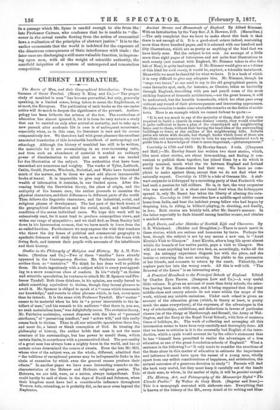Studies in the Philosophy of Religion and History. By A.
M. Fair- bairn. (Strahan and Co.)—Two of these " studies " have already appeared in the Contemporary Review. Mr. Fairbairn modestly de- scribes them as "tentative." We think he has done well to publish them. He deals ingeniously with a subject which is every year appeal- ing to a more numerous class of readers. In his " study " on theism and scientific speculation, he ventures to attack Mr. H. Spencer and Pro- fessor Tyndall. Both these thinkers, in his opinion, are really forced to admit something equivalent to theism, though they invent phrases to avoid it. Mr. Spencer is obliged to speak of a "cause which transcends our knowledge,' and resorts to other phrases which, in fact, cover more than he intends. It is the same with Professor Tyndall. His " matter " ceases to be material when he lets in "a power inscrutable to the in- tellect of man," and his remark to his audience "that there is, you see, no rank materialism here," was delightfully naive. The evolution theory, Mr. Fairbairn maintains, cannot dispense with the idea of "personal attributes," of " perceiving intellect," and "active will," and this really comes back to theism. Thus in all our scientific speculation there lies, and must lie, a latent or blank conception of God. In treating the philosophy of history, the author holds that man is not the mere creature of his surroundings, but has power to mould them, within certain limits, in accordance with a preconceived ideal. The personality of a great man has always been a mighty force in the world, and has at pertain crises determined the course of events. Even the late Mr. Mill, whose view of the subject was, on the whole, different, admitted that 4‘ the volitions of exceptional persons may be indispensable links in the chain of causation by which even the general causes produce their effects." In another paper we have some interesting remarks on the characteristics of the Hebrew and Hellenie religious genius. The Hebrews, we are told, were, as a nation, always insignificant. This could hardly be said of them in the days of David and Solomon, when their kingdom must have had a considerable influence throughout Western Asia, extending, RH it probably did, as far as or even beyond the Euphrates.






































 Previous page
Previous page